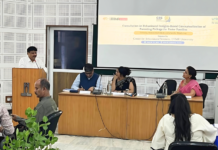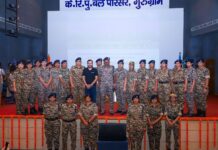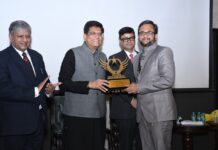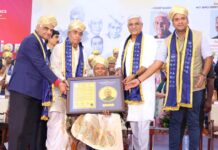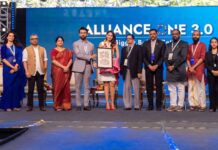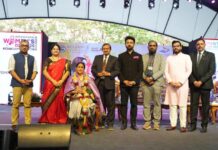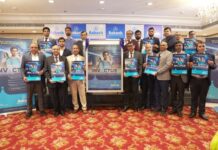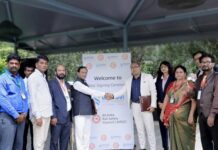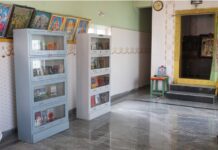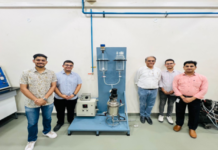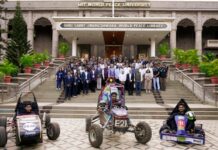Kolkata, August 27, 2020: Maulana Abul Kalam Azad University of Technology (MAKAUT), WB and the Centre of Linguistics recently arranged for a Corporate Classroom in digital platform on 07. 08.2020 to guide the students regarding the mode of communication that helps in facing of Interviews with confidence. The topic was, “A Skill Set worth a Thousand Words: Developing Communication Skills that Speak in Your Favour”.
The Guest Speaker was Mr. Avik Chakraborty Human Resources-Executive of Cognizant Technology Solutions. He guided students about communicating in interwiews, with respect to Information Technology (IT) and Information Technology Enabled Services (ITES) based industries. The Moderator was Dr. Anandarup Sarangi, the Training & Placement Officer of MAKAUT.
The Programme Coordinator Mr. Shaswata Sengupta, Assistant Professor, Centre of Linguistics, MAKAUT, WB said that in order to be successful in professional life the ability of communication must be there. Mr. Sushanta Kayal, Faculty and Coordinator, Centre of Linguistics, MAKAUT, WB encouraged the students to vigorously participate in these kinds of live sessions.
Prof. (Dr.) Saikat Maitra said that these sessions are very important for the student community. He pointed out that communication skill can be of two types: General Communication and Professional Communication. General Communication can be a lazy one, where one may not be too much careful. But in Professional Communication, one must be careful about pronunciation and selection of right words. Again, in order to be a successful professional in future, two things are very important:
At the outset, the Vice Chancellor of MAKAUT, WB
Computation, that is, the language of computer has to be understood.
Communication, that is , the skill to understand the language of human beings. Herein comes the importance of learning English.
Prof (Dr.) Sukhendu Samajdar, Director, Natural & Applied Sciences , MAKAUT, WB echoed the words of the Vice Chancellor and said. “We have to communicate simultaneously with intelligent machines and emotional human beings.”
Mr. Avik Chakraborty of Cognizant logically explained the importance of communication in facing interviews, with special reference to IT and ITES sectors with the help of his presentation. He explained the various aspects of Effective Communication and pointed out that, it is very important to respond to the point, as people do not have time to listen to stories. This is true for facing interviews, as well as for facing clients in future professional life. In this connection, Mr. Chakraborty pointed out that, a student must align himself/herself to the skills required in a particular industry. The earlier one can do that, the earlier is the chance of getting employed. He gave tips regarding how to go up the ladder in IT & ITES industries.
IT Industry professionals have to deal with software development, maintenance, testing and so on. Such a person must have a good knowledge of core subjects and English.
While facing an interview, one should speak out about one’s vocational training. Such extra-curricular activities must be mentioned, which are aligned to industry, eg., internet surfing, blogging and so on. Without communication skill, however, it will not be possible to speak out.
The Requirements for facing interviews in IT and ITES industries were highlighted according to priority by Mr. Chakraborty. In IT sector, core skills are more important and that is why basic communication skill English will do. But in the case of ITES industry, a professional must have very strong skill in English Communication, as he/she will have to speak to clients and users.
In the case of ITES industry, point numbers 3 and 4 are essential, as the interviewers want to judge the team building capacity of the candidate. An ITES professional has also to work with teams from different countries and cultures. Confidence will certainly help to improve communication skill. If the academic fundamentals of a candidate are strong, then by default, he/she will get confidence while facing an interview. For example, interviewers may ask to write the same programme to two candidates. One who knows the details will be selected. A candidate should not try to deceive the experienced interviewers. One must not be over-confident. One must convey through one’s body language as to whether one is willing to learn or not, after joining an organization.
Another negative point in the way to success is Mother Tongue Influence (MTI) and it must be controlled as far as possible.
Flexibility is important, with regard to relocate and in adapting technological changes.
Overall, in the adjoining diagram, those falling in the Red Zone will get a high chance of being selected.
The Question-Answer session was very interesting and some of the useful questions were:
Q.1. How to interact, after entering the Interview Hall?
Ans: One must not read from one’s own resume. In fact, it implies that the candidate assumes that the interviewers cannot read!
The candidate must explain the panelists that :
- he/she is a team player
- he/she is open to relocation
- he/she has both positive and negative aspects, that is, what type of person one is
Moreover, one must always have a small smile on the face and should not be afraid or over-confident.
Q.2. How important it is to talk about the project completed in student life?
Ans: It must convey, whether the candidate can work in a team. Interviewers want to judge, whether the candidate will be able to appreciate the achievements of a team. Many candidates want to project themselves as team leaders, but the interviewers want team players.
Q.3. What is Soft Skill?
Ans: It is a combination of Body Language, Attitude (eye to eye contact reflects good attitude), dress and communication skill
Corporate Comm India (CCI Newswire)



